Meet Jason Darien Riadi. a passionate coffee professional whose journey began with a curious sip of his father’s morning brew. Originally from Indonesia and trained in Aerospace Engineering in Germany, Jason found his passion in the cup and the community it represents. His career has taken him from Starbucks to specialty roasteries, from casual side jobs to the German Brewers Cup podium.
Now Head Bar and Roaster at Glücksbohne Rösterei in Bremen, Jason bridges the gap between craft, hospitality and scientific precision. With a heart for community. and a spirit that thrives on curiosity and creativity, Jason sees coffee not just as a beverage but as a journey worth sharing.
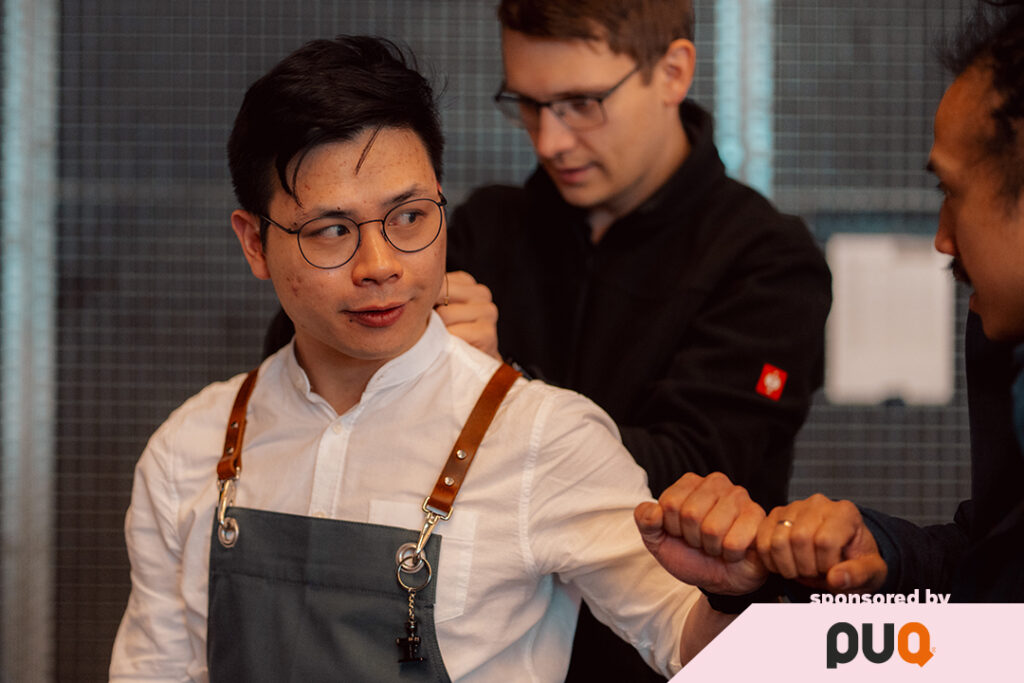
Jason, what is your first memory with coffee?
My first memory with coffee was actually kind of funny. As a kid, I was always near the kitchen—my mom had a restaurant back then, and I loved tasting and smelling things, and helping her out. She would always make coffee for my dad in the morning (traditional coffee called Kopi Tubruk).
One day, I got curious about what he drank every single day, so I stole a sip. It was strange, but I liked it. I liked the bitter taste and the complexity of the coffee (I was only 13). Later, they let me join public cuppings in my hometown, and we even visited a coffee farm. That’s how it all started.
What inspired you to pursue a career in the coffee industry, and how did you get started? What did you do before coffee?
It all began as a side job—I moved to Germany to study Aerospace Engineering, and coffee was just a side job to support myself. But somewhere along the way, it stopped being “just a job.” I fell in love with the ritual, the community, and the creativity it allowed.
Back in 2016, specialty coffee wasn’t very present in Bremen. Starbucks was my first step into the industry. It was a solid starting point, and I learned a lot. After two years, my boss invited me to join a new specialty café and roastery in Bremen. That’s when everything shifted. I started diving deeper into roasting, and because of my background in Engineering, I found the science behind it especially fascinating. Thermodynamics helped me understand what was happening inside the roaster. It made sense in a way that truly excited me.
Later, in 2020, during an internship in Indonesia, I started a small micro-roastery as a side project with a local coffee farmer from Flores. That collaboration changed everything. I started taking things seriously—pursuing certifications, learning continuously, and eventually stepping into the world of competition.
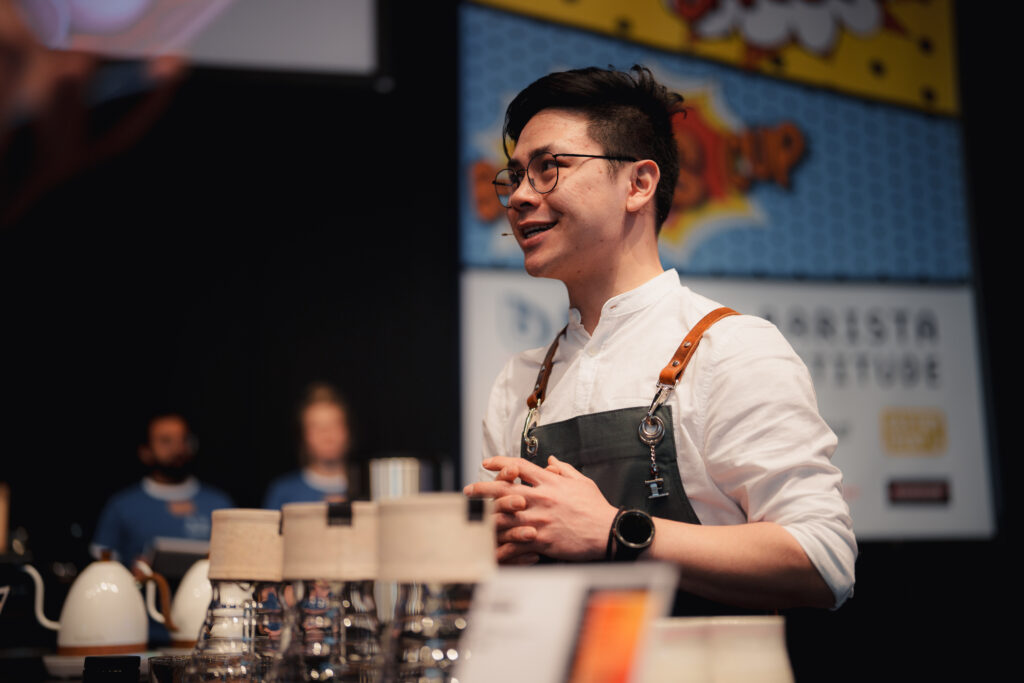
Tell us a bit about the place you work at. What are your roles there?
Right now, I work at Glücksbohne Rösterei in Bremen. My Boss, Jens (who is also a Roaster), opened it in October 2022. I started as a barista and roaster, developing roast profiles for new coffees. Eventually, I became Head Bar as well. So I’m involved in everything—from green beans to espresso shots. It’s a small team, but we care a lot about what we do. So come visit us!
How do you manage to combine two such demanding and responsible roles?
Oddly enough, it’s made things easier. Normally, a roaster and a head barista might have different ideas about what “good coffee” means. But wearing both hats allows me to bridge that gap. I can create roast profiles and immediately think about how they’ll perform in the cup.
The biggest challenge? Time. Since coffee is still a side job for me, I can’t always be there. Fortunately, I work with an incredible team that shares the same commitment to quality and consistency.
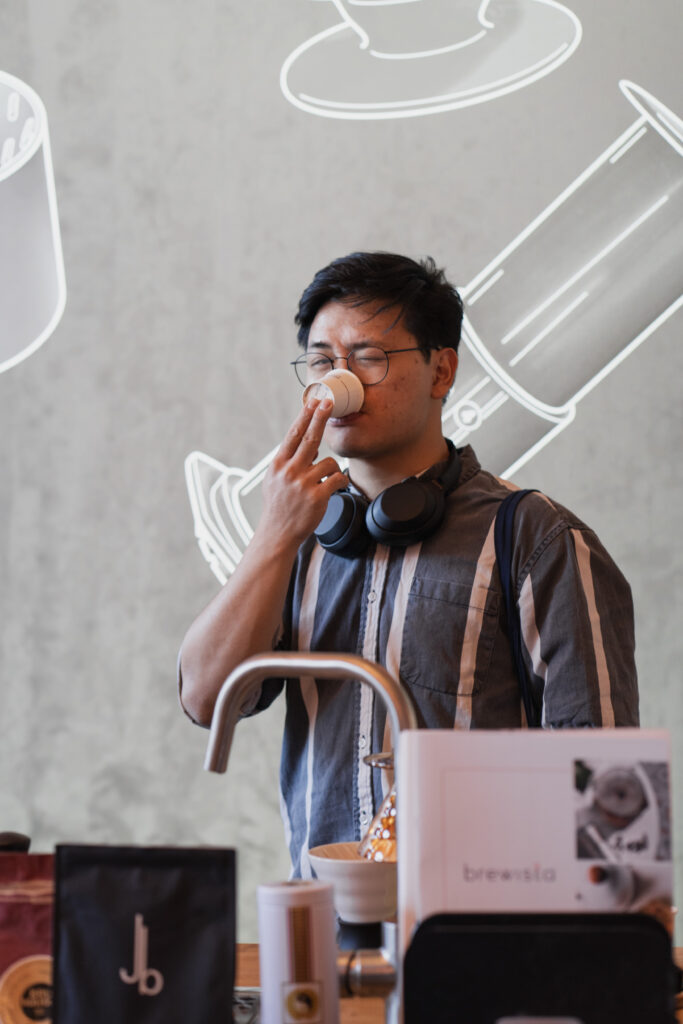
What kind of experience do you want your customers to have when they visit you at the cafe?
I want every customer to feel comfortable, like they’re visiting a good friend’s home. Specialty coffee can feel overwhelming, with all the names, origins, and methods. But we’re here to help. I always tell guests: just ask. We’ll walk you through it. It’s not about impressing people—it’s about sharing something beautiful.
What is your favourite part of the day at work, and why? Which responsibilities bring you the most joy?
When I’m roasting, I love the quiet focus it brings—reading the graph, adjusting the heat, thinking about flavour development. It’s almost meditative.
But as a barista, the highlight is always the human interaction. Seeing someone take a sip, pause, and smile—that’s everything. It’s a moment of connection that reminds me why I do this.
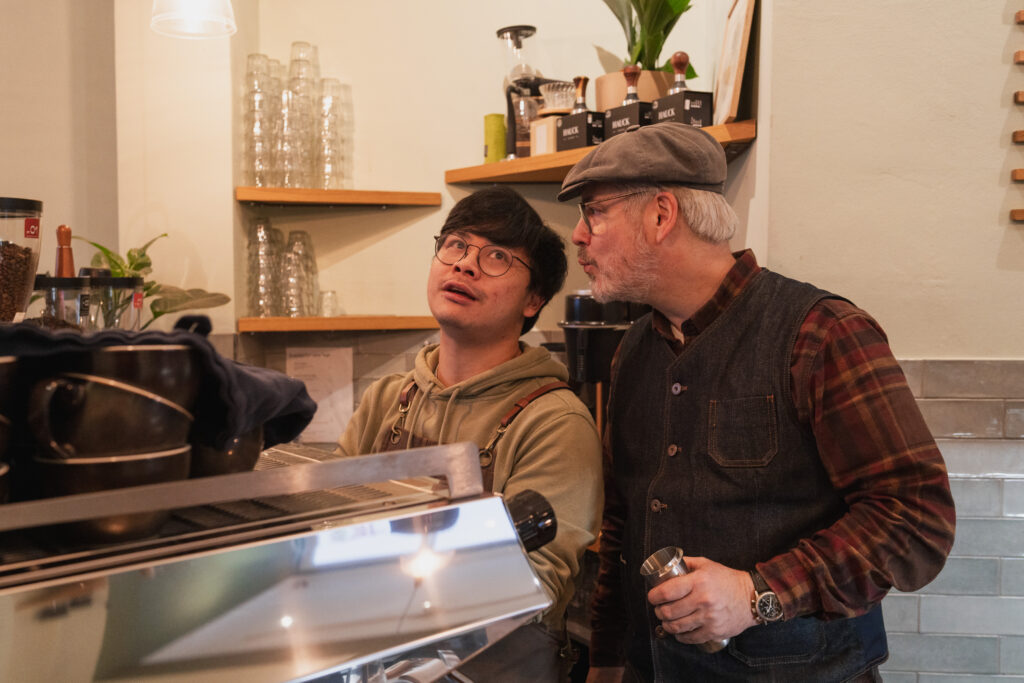
How do you stay motivated and inspired to keep improving your coffee-making skills?
Competitions keep me sharp—they push me to train, experiment, and refine my technique. But honestly, my biggest motivation is the people. There’s a regular who waits over 10 minutes on weekends just for a hand brew. That level of trust and patience inspires me to do better.
I believe in slow, steady progress. Stay curious, keep learning, and improvement will come.
What are the current trends in cafes in your region? Are there any trends you promote yourself and would like to see more often in other places?
Although Bremen is historically known as a coffee city, the specialty scene is still growing. In the last two years, I’ve seen a real wave of new cafés opening—and that’s exciting.
At Glücksbohne, we often introduce people to lighter roasts for their coffee, or by offering a small cup of batch brew, sometimes on the house, to encourage curiosity. One trend I personally like to promote is the split shot: instead of a double espresso, we serve one for tasting and one with milk. It gives the guest a fuller picture of the coffee’s potential.
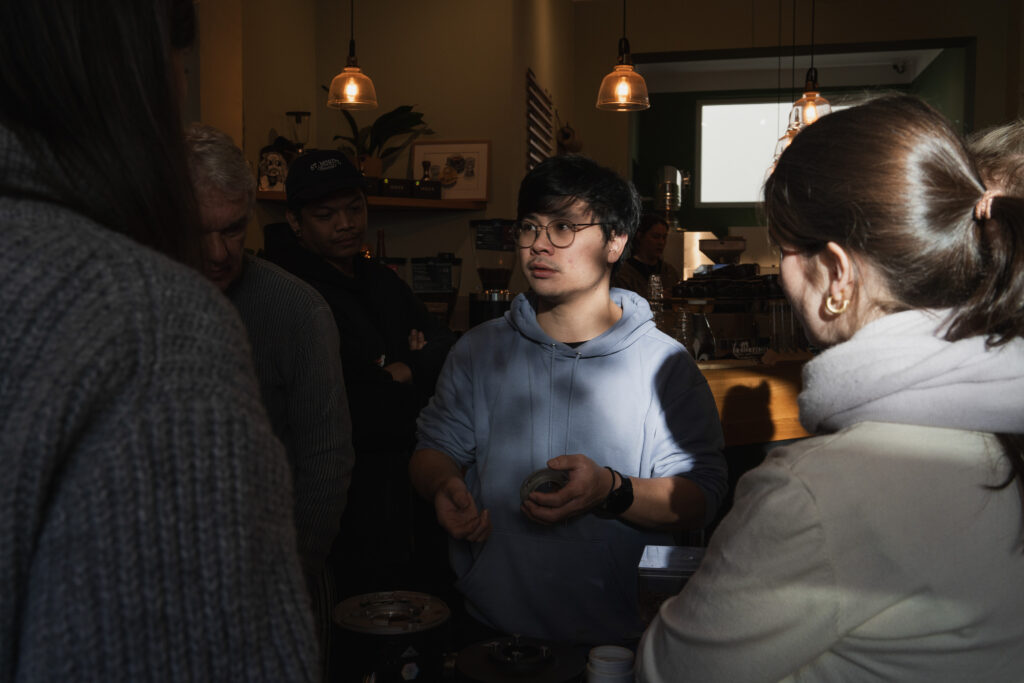
What are some common misconceptions about our industry that you’ve encountered, and how do you address them?
The most common one is: “Your coffee is too expensive—I can get it cheaper at the supermarket.”
And I get it. But I explain that we do direct trade and pay fairly. In our case, 49–60% of what the customer pays goes back to the farmer. That’s a fair share—and it’s what helps build sustainable, high-quality coffee. People often compare coffee to wine, and I think it’s the same—what you’re paying for is not just the drink, but the entire process, the story, and the hands behind it.
If there were one piece of knowledge about coffee you’d like everyone to know, what would that be?
That coffee is a journey, not just a product. From the cherry on the farm to the final cup, there’s passion, precision, and people involved in every step. So take your time. Slow down, and really experience what’s in your cup. There’s a whole story waiting there.
You have some nice achievements in championships. Can you tell us more about them?
I’ve never really seen myself as a competitive person. What drives me most is curiosity and the urge to push my limits. The German Brewers Cup 2024, held right here in Bremen, was my first time competing in that category.
At first, I wanted to do both Brewers Cup and Barista Championship. But my coach stopped me and asked a simple but powerful question: “Do you want to win, or are you just doing this for fun?”. He told me, “If it’s just for fun, I can’t join your journey.” That gave me something to think about. A short time later, I told him, “Let’s go win this.”
That decision turned everything around. From that moment, we trained hard. It was far from smooth sailing—we changed our competition coffee two weeks before the event, and I only finalised my script a week out. The night before the competition, I was still training late, trying to get every detail right. It was exhausting and emotional, but I was driven.
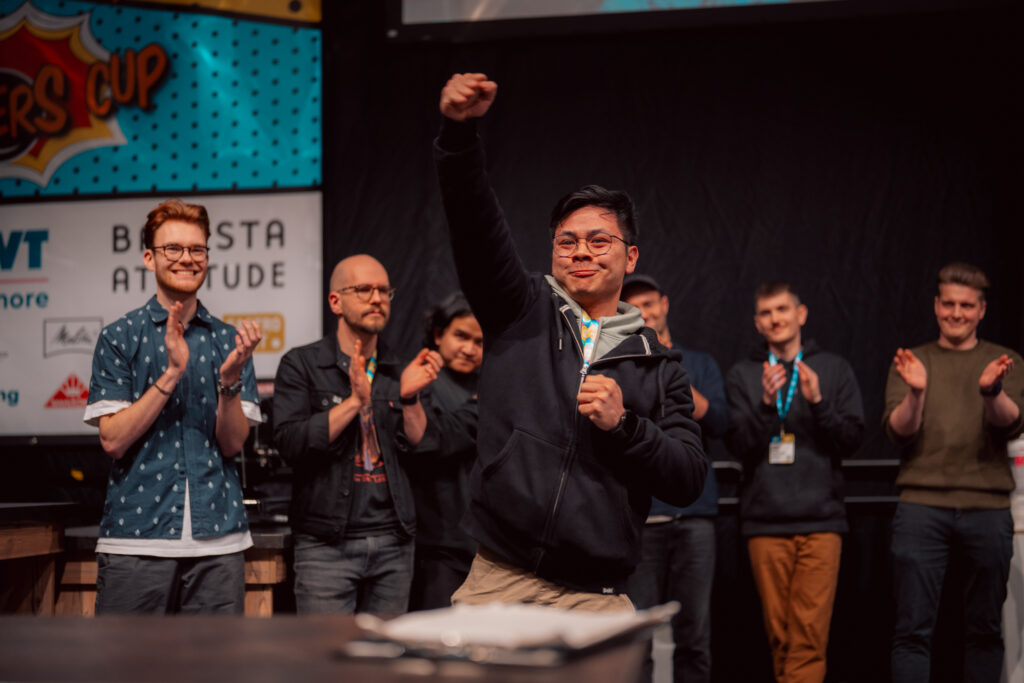
The competition itself was intense. The room was filled with seasoned brewers, including the reigning champion. But somehow, I made it through the first round.
Then came the semi-finals: the compulsory round. My coach was nervous—I was still an active smoker then, and he feared it might dull my sensory perception. But I felt surprisingly calm. I ended up getting the highest score in that round and secured my place in the final.
The final round was incredibly tough. Everyone was so skilled. I had secretly hoped for more than third place, but standing on that podium, surrounded by my friends, co-workers, and family, was unforgettable. It wasn’t just about winning. I grew, not just as a coffee professional, but as a person.
What are the next championships you’d like to compete in?
I’m taking a short break from competing to refocus. But I’d love to come back to the Brewers Cup, try my hand at Roasting, and maybe even Coffee in Good Spirits someday.
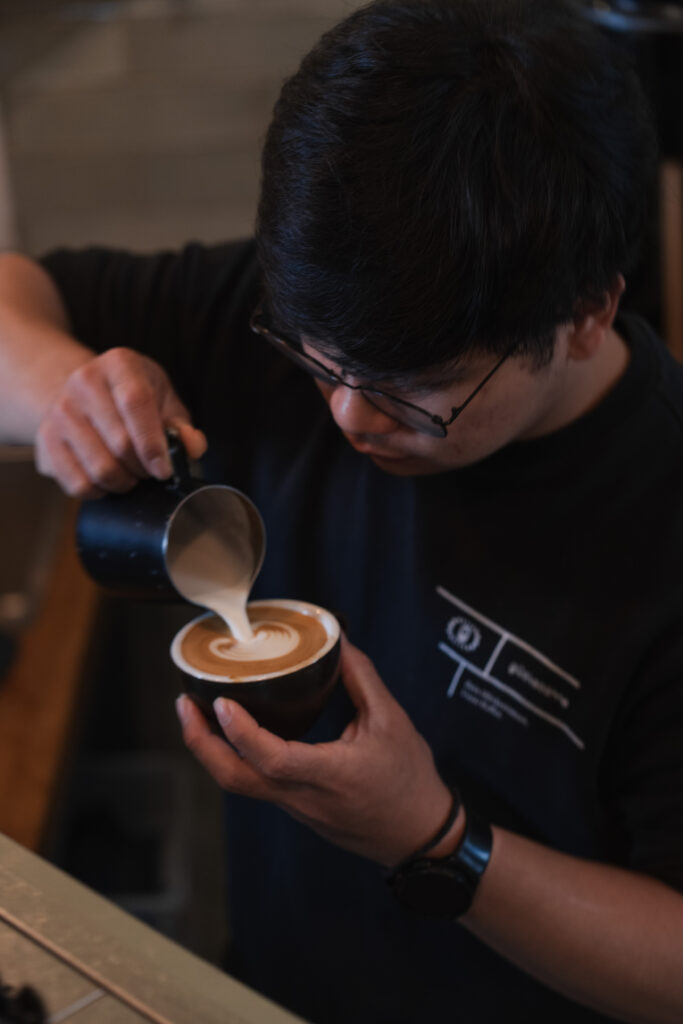
What is in your opinion the most important thing to have in mind when you start to compete in coffee championships?
Two words: consistency and mindfulness. It’s not just about polishing your skills—it’s about building a mindset. Improve a little every day, with purpose and care. Like the Japanese concept of Kaizen—small, continuous progress adds up to something powerful.
What coffee challenges are you looking forward to? Any new projects or collaborations?
Right now, I’m not planning on entering another competition just yet. My focus is on growing with Glücksbohne, exploring opportunities that are slowly unfolding. There are a few exciting things on the horizon, but for now, I’m just grateful to be doing what I love. Working with coffee—it’s not just a job. It’s a privilege.

Quick Fire Questions for Jason Darien Riadi:
Filter coffee or espresso-based?
Filter coffee all the way!.
Milk coffee or black coffee?
Black.
The most underrated coffee drink?
A good Batch brew.
The most underrated coffee brewer?
Kalita, it can brew a good coffee.
What brewing method do you use at home?
Mostly Graycano & Orea
Favourite barista tool?
Quinspinn & PUQ Press.
No.1 café in Europe that every coffee geek should visit?
There are a lot of my favourite cafes, but I think Machhörndl is worth a visit!
What’s your favourite city to have a specialty coffee tour outside of “your city”, and why?
Vienna & Amsterdam. They offer two different points of view on what determines specialty coffee scene, and the cities give a warm vibe.

